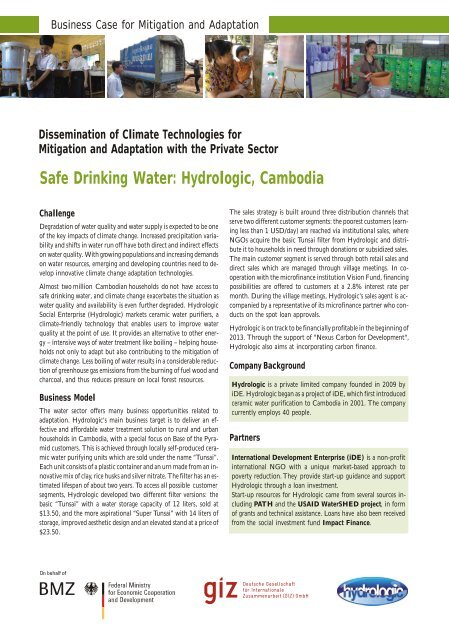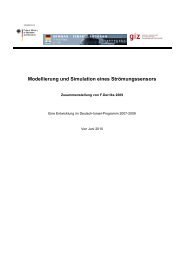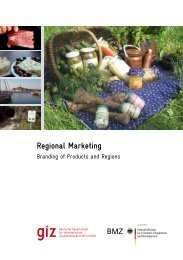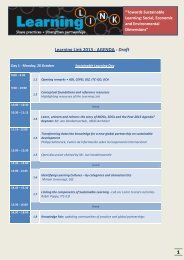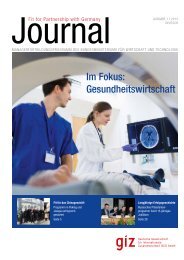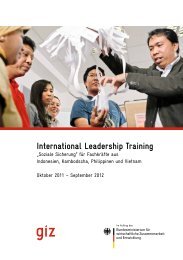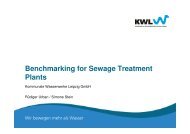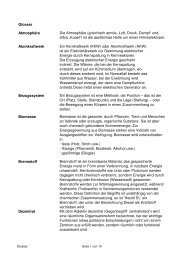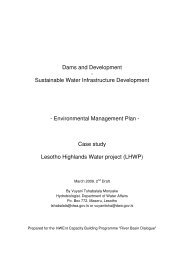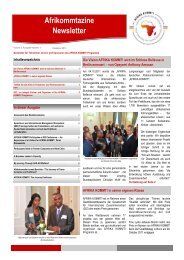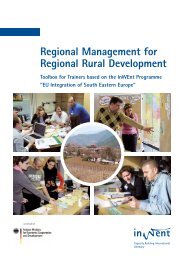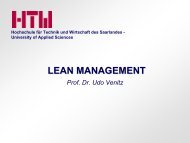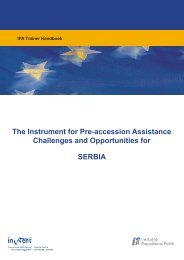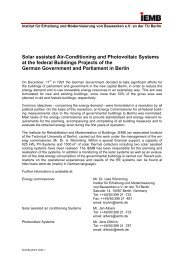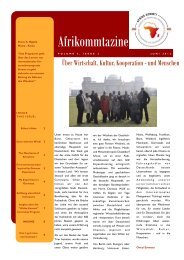Safe Drinking Water: Hydrologic, Cambodia - GIZ
Safe Drinking Water: Hydrologic, Cambodia - GIZ
Safe Drinking Water: Hydrologic, Cambodia - GIZ
You also want an ePaper? Increase the reach of your titles
YUMPU automatically turns print PDFs into web optimized ePapers that Google loves.
Business Case for Mitigation and Adaptation<br />
Dissemination of Climate Technologies for<br />
Mitigation and Adaptation with the Private Sector<br />
<strong>Safe</strong> <strong>Drinking</strong> <strong>Water</strong>: <strong>Hydrologic</strong>, <strong>Cambodia</strong><br />
Challenge<br />
The sales strategy is built around three distribution channels that<br />
serve two different customer segments: the poorest customers (earn-<br />
Degradation of water quality and water supply is expected to be one<br />
ing less than 1 USD/day) are reached via institutional sales, where<br />
of the key impacts of climate change. Increased precipitation varia-<br />
NGOs acquire the basic Tunsai filter from <strong>Hydrologic</strong> and distribility<br />
and shifts in water run off have both direct and indirect effects<br />
bute it to households in need through donations or subsidized sales.<br />
on water quality. With growing populations and increasing demands<br />
The main customer segment is served through both retail sales and<br />
on water resources, emerging and developing countries need to dedirect<br />
sales which are managed through village meetings. In covelop<br />
innovative climate change adaptation technologies.<br />
operation with the microfinance institution Vision Fund, financing<br />
Almost two million <strong>Cambodia</strong>n households do not have access to possibilities are offered to customers at a 2.8% interest rate per<br />
safe drinking water, and climate change exacerbates the situation as month. During the village meetings, <strong>Hydrologic</strong>'s sales agent is acwater<br />
quality and availability is even further degraded. <strong>Hydrologic</strong> companied by a representative of its microfinance partner who con-<br />
Social Enterprise (<strong>Hydrologic</strong>) markets ceramic water purifiers, a ducts on the spot loan approvals.<br />
climate-friendly technology that enables users to improve water<br />
<strong>Hydrologic</strong> is on track to be financially profitable in the beginning of<br />
quality at the point of use. It provides an alternative to other ener-<br />
2013. Through the support of "Nexus Carbon for Development",<br />
gy – intensive ways of water treatment like boiling – helping house-<br />
<strong>Hydrologic</strong> also aims at incorporating carbon finance.<br />
holds not only to adapt but also contributing to the mitigation of<br />
climate change. Less boiling of water results in a considerable reduc-<br />
Company Background<br />
tion of greenhouse gas emissions from the burning of fuel wood and<br />
charcoal, and thus reduces pressure on local forest resources.<br />
<strong>Hydrologic</strong> is a private limited company founded in 2009 by<br />
iDE. <strong>Hydrologic</strong> began as a project of iDE, which first introduced<br />
Business Model<br />
ceramic water purification to <strong>Cambodia</strong> in 2001. The company<br />
The water sector offers many business opportunities related to currently employs 40 people.<br />
adaptation. <strong>Hydrologic</strong>'s main business target is to deliver an effective<br />
and affordable water treatment solution to rural and urban<br />
households in <strong>Cambodia</strong>, with a special focus on Base of the Pyra- Partners<br />
mid customers. This is achieved through locally self-produced ceramic<br />
water purifying units which are sold under the name “Tunsai”. International Development Enterprise (iDE) is a non-profit<br />
Each unit consists of a plastic container and an urn made from an in- international NGO with a unique market-based approach to<br />
novative mix of clay, rice husks and silver nitrate. The filter has an es- poverty reduction. They provide start-up guidance and support<br />
timated lifespan of about two years. To access all possible customer <strong>Hydrologic</strong> through a loan investment.<br />
segments, <strong>Hydrologic</strong> developed two different filter versions: the Start-up resources for <strong>Hydrologic</strong> came from several sources inbasic<br />
“Tunsai” with a water storage capacity of 12 liters, sold at cluding PATH and the USAID <strong>Water</strong>SHED project, in form<br />
$13.50, and the more aspirational “Super Tunsai” with 14 liters of of grants and technical assistance. Loans have also been received<br />
storage, improved aesthetic design and an elevated stand at a price of from the social investment fund Impact Finance.<br />
$23.50.
Benefits<br />
iDE<br />
The water sector is heavily affected by climate change, which has problems. An emission-free ceramic water filter improves public<br />
direct effects on the consumption of water by households. health and in-house air quality, which is particularly beneficial for<br />
<strong>Hydrologic</strong>'s technology improves drinking water quality, allows women and children who spend a lot of time in the kitchen.<br />
some water savings, and therefore helps local households to adapt to Subsequently school attendance of the children is increased, lost<br />
climate change. In 2011, <strong>Hydrologic</strong> sold more than 45,000 water productivity from waterborne diseases is reduced, and less financial<br />
filters. With over 230,000 filters sold in the last ten years and an resources are needed for medical care. Due to the passive nature of<br />
estimated filter lifespan of about two years, more than 80,000 tons the purification process more time can also be spent in gainful actiof<br />
wood has been preserved so far. Furthermore considering the fact vities and childcare.<br />
that onefilter eliminates about 0.46 tons of carbon dioxide during<br />
each year of use, <strong>Hydrologic</strong> managed to achieve a total carbon offset<br />
As a social enterprise, <strong>Hydrologic</strong> improves the living conditions of<br />
of 188,500 tons since its start of operation as an iDE managed pro-<br />
poor populations that are more exposed to the risks of climate<br />
ject in 2001.<br />
change by providing them with a safe water supply, but also by in-<br />
countryfilter fabrication that creates local employment opportuni-<br />
Almost 60% of the households in <strong>Cambodia</strong> that rely on boiling for ties, but also by creating local employment opportunities through<br />
water purification purposes burn fuel wood or charcoal within their<br />
houses.This results in severe respiratory illnesses and heart and eye<br />
the local fabrication of the filters.<br />
Contact: Mr. Michael Roberts, Director, <strong>Hydrologic</strong>: mroberts@ide-cambodia.org<br />
Website: http://www.hydrologichealth.com/<br />
Sources: “An excellent idea” (2011): in Healthcare in Asia. The innovation imperative by Economist<br />
Intelligence Unit: http://download.economistconferences.asia/HIA_White%20Paper_2011.pdf,<br />
retrieved on February 9, 2012.<br />
Photo credits: <strong>Hydrologic</strong><br />
Founding partner<br />
“Economic Impacts of Sanitation in <strong>Cambodia</strong>” (February 2008): in Economics of Sanitation<br />
Initiative, World Bank:<br />
https://www.wsp.org/wsp/sites/wsp.org/files/publications/ESI_<strong>Cambodia</strong>_full.pdf, retrieved<br />
on February 9, 2012.<br />
Authors: adelphi: Rainer Agster, Anais Mangin, Jona Liebl<br />
<strong>Hydrologic</strong><br />
NGO Retailer<br />
Donation or<br />
subsidized sale<br />
Poorest customers<br />
( <<br />
1 USD/day)<br />
Sale<br />
Sale<br />
Main customers<br />
(1-5 USD/day)<br />
Carbon Finance<br />
Project<br />
Direct Sale<br />
(with a possible micro-credit)<br />
Nexus Carbon for Development<br />
Micro-Finance Institution<br />
(e.g. Vision Fund)<br />
Project:<br />
“Dissemination of Climate<br />
Technologies for Mitigation<br />
and Adaptation with the<br />
Private Sector”<br />
Project responsible:<br />
Ms Heike Bürskens<br />
heike.buerskens@giz.de<br />
www.giz.de/ibf<br />
Source: <strong>Hydrologic</strong>


